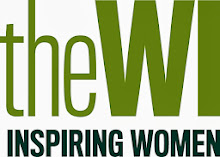The
Women’s Institute (WI) movement in Britain began in wartime. Established in
1915, the movement encouraged countrywomen to get involved in growing and
preserving food to help to increase the supply of food to the war-torn nation.
By
the outbreak of the Second World War in 1939, the WI was a well-established and
expanding network with an independence that the then Chairman, Lady Denman, was
keen to maintain. Many WI members went into uniform, some joined the Land Army,
others met the need for workers in the armaments industry. Tens of thousands of
WI members, especially older women and young mothers, responded to the need for
increased agricultural production by working on farms whenever and wherever
help was needed. Many WI members became air raid precautions (ARP) wardens,
firewatchers or joined such services as the Red Cross and St John’s Ambulance
Brigade.
At
government request, the headquarters of the WI drew up a detailed plan for the evacuation
of mothers and children from cities under the imminent threat of bombing. The
evacuation was organised by the newly established Women’s Voluntary Service and
children arriving in villages were largely housed by WI members. The National
Federation of Women’s Institutes (NFWI) went on to publish a report based on a
survey carried out amongst WI members: Town Children through Country Eyes.
The report stimulated a national debate about support for families ultimately
leading to the setting up of family allowances after the war.
WI
members also initiated a number of projects designed to help the war effort. A
War Savings group was formed, which among other activities organised
house-to-house collections of rags and bones for government. Cotton reels were
collected and surplus vegetables sold to the Navy. Lady Denman was asked to
take charge of the Women’s Department of the Ministry of Agriculture. Together
with Mrs Inez Jenkins, a former WI National Secretary, she devised the plan for the Women’s Land Army
with her house at Balcombe Park as the headquarters. Lady Denman organised
correspondence courses on aspects of agriculture – ensuring that the women of
the Land Army were qualified for better jobs once the war was over.
As
the war continued, WI members were taught how to grow fruit and vegetables more
intensively in their gardens and allotments. Fruit bushes and packets of
vegetable seeds from WIs in Canada were sold through the newly established
Guild of Produce. The Ministry of Food gave the National Federation a grant to
administer the National Fruit Preservation Scheme. Five hundred home canners,
oil stoves, preserving pans, and other equipment were sent from America to be distributed
to WIs who ‘fought on the jam front with pans, spoons and weighting sales and
sheer stickability’. About £1400 worth of sugar for preserving was distributed
to the Federation offices, and teams went from village to village canning what
fellow WI members had picked. By end of 1940, the WI had cooked, bottled, and
canned 1630 tons of fruit and vegetables in preserving centres set up in village
halls and sheds, kitchens, or mobile canning vans. WIs also continued their
musical, dramatic, handicraft, and other cultural activities ‘to relieve the
strain of war’ and maintain health, strength, and good spirits in the village.
This
spirit of participation survives to this day, the WI is once again growing and the
organisation continues to be actively engaged in campaigns and projects around
local food, growing and preserving vital preservation and cooking skills. Our
war-time heritage is an important, and overlooked, national resource,
demonstrating just how much can be done by a network of dynamic and
well-organised women called to action.
The
New Home Front
This
week the WI has been revisiting the home front. The second New Home Front
report, published earlier this week includes a proposal for the nation to help
us meet the challenges of climate change. The report, launched by
Caroline Lucas MP, brings together a range of commentators and experts on
climate change, food and community organisation. Taking World War Two as
the start point, we look at what the lessons are for the urgent threat posed by
climate change.
You
can download the report here http://www.newhomefront.org/sites/default/files/NHF2_web.pdf

No comments:
Post a Comment